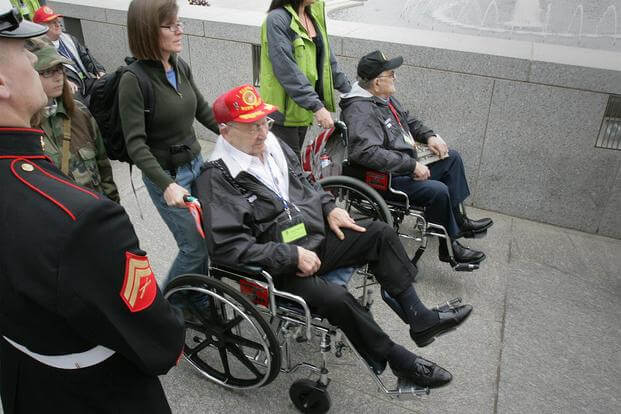Delphine Metcalf-Foster is the national commander of the Disabled American Veterans (DAV) and a disabled U.S. Army veteran of the Gulf War. She served as caregiver to her husband, also a disabled Army veteran.
Our nation's veterans put their lives on the line to defend and protect the American people, and we owe it to them and their families to ensure they receive the care and support they earned.
Unfortunately, many ill and injured veterans of World War II, the Vietnam War, Korean War and Gulf Wars -- as well as their caregivers -- are being excluded from a range of critical Department of Veterans Affairs support services.
Since 2010, veterans injured after Sept. 11, 2001, have been eligible for benefits and support through the VA's Program of Comprehensive Assistance for Family Caregivers -- to include respite care, access to health insurance, a modest stipend and home health training. But veterans of past generations are ineligible for the program, all because of an arbitrary date.
The Disabled American Veterans had pushed hard and advocated for inclusion of a provision expanding eligibility of this program to veterans of all eras in the omnibus spending package released in late March. Unfortunately, the provision did not make it into the final bill that Congress enacted.
I personally know the sacrifice caregivers make. When my husband Jimmy -- who was also an Army veteran -- developed Alzheimer's and dementia, I was suddenly thrust into the role of caregiver. I did my best to give him the support he needed, but I also had to work full-time because we had limited resources.
As much as I wanted to keep my soldier home, his condition worsened. I grew older, and soon his care was too much for me to handle. I was forced to move Jimmy to a nursing facility, where he lived out the remainder of his days.
If Jimmy had served after 9/11, we may have been eligible for comprehensive VA caregiver assistance. He could have spent the rest of his life where he belonged -- at home, with me.
Sadly, my story is not unique.
Veteran caregivers often live a life of immense, though humble, self-sacrifice. Many must halt their careers, forgo educational pursuits and set aside personal goals to provide the care needed to a loved one seriously injured in the line of duty.
Caregivers rarely put their own needs first and, in many cases, they themselves experience a decline in physical and emotional health as they tirelessly see to the needs of their veteran.
A 2017 DAV study confirms these troubling statistics. Almost 80 percent of caregivers who received no federal support said they had suffered negative impacts on their health, career, financial security and family relationships.
It's true that our post-9/11 veterans need and deserve access to the VA's caregiver support program, and it has done so much to ease the strains and stresses that come with caregiving.
But tens of thousands of veterans of previous wars and their caregivers have been going it alone -- with little to no outside help or support -- for decades. As the veterans age, their illnesses and injuries often worsen. Meanwhile, their caregivers grow older and their ability to care for their loved one may diminish too.
We firmly believe that no matter when a service-connected injury occurred, veterans have earned the right to equal care and benefits. A single date on the calendar should not determine how much support a seriously disabled veteran receives.
For too many of our nation's veterans, the restrictive post-9/11 eligibility criteria for the VA's caregiver program has meant a life of insult added to serious injury. They and their caregivers have incurred unnecessary emotional and financial hardships on top of life-altering disabilities, and that is simply unjust.
This was a historic opportunity to incorporate a much-needed, long-awaited reform policy that would have dramatically improved the quality of life of our nation's veterans and their caregivers. But we cannot let our foot off the gas as we drive toward this important goal.
We must do better by our veterans, and we call on Congress and the Trump administration to do what is right and what is fair by supporting expansion of caregiver benefits and support services to all generations of severely injured veterans.
-- The opinions expressed in this op-ed are those of the author and do not necessarily reflect the views of Military.com. If you would like to submit your own commentary, please send your article to opinions@military.com for consideration.















